|
|
|
Sort Order |
|
|
|
Items / Page
|
|
|
|
|
|
|
| Srl | Item |
| 1 |
ID:
174596


|
|
|
|
|
| Summary/Abstract |
The decade of 1950–60 was unique in terms of the establishment of a supranational Arab union, known as the United Arab Republic. However, this union was ill born due to certain frictions between Arab states in the Middle East. There were divergences between the visions of Arab Nationalism for each state and this caused a troubling process for this supranational initiative. This study considers these frictions as the main reasons behind why the UAR was an unsuccessful attempt and further why the Arab Nationalism dissolved afterwards. The divergence between two competing visions of Arab Nationalism is symbolized through the competition between Iraqi prime minister Abd al-Karim Qasim and Egyptian president Gamal Nasser. The domestic, regional and global circumstances for these two countries and their leaders are analyzed in order to illustrate how these frictions became a reality and divided the Arab stance.
|
|
|
|
|
|
|
|
|
|
|
|
|
|
|
|
| 2 |
ID:
163842
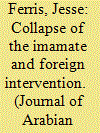

|
|
|
|
|
| Summary/Abstract |
his paper considers the various factors at play in the buildup to the 1962 revolution and its immediate aftermath, focusing on the role of foreign and particularly Egyptian intervention. Relying primarily on Yemeni and Egyptian sources, it concludes that the collapse of the Imamate owed primarily to domestic factors, and that Egyptian involvement proved more important to the outcome of the revolution than to its instigation.
|
|
|
|
|
|
|
|
|
|
|
|
|
|
|
|
| 3 |
ID:
180050
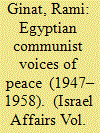

|
|
|
|
|
| Summary/Abstract |
This article sets out to closely scrutinise the main phases of the campaign for peace (1947–58) undertaken by left-wing Egyptian groups. Based on exclusive first-hand Egyptian communist primary sources – archival and others, it shows that although the communists were the only Egyptian political groups to support the November 1947 UN partition resolution on Palestine, President Gamal Abdel Nasser later, during the Bandung Conference (1955), followed suit yet no concrete official actions were taken by neither the Egyptian nor the Israeli political elites before the 1956 Suez War. Following that war, the prospects for an Egyptian–Israeli peace settlement were shut off for nearly two decades.
|
|
|
|
|
|
|
|
|
|
|
|
|
|
|
|
| 4 |
ID:
123643
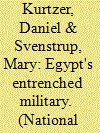

|
|
|
|
|
| Publication |
2012.
|
| Summary/Abstract |
FIFTY YEARS ago, drawn to the perceived dynamism of fresh, young military leaders, scholars and policy analysts became enamored of the potential role of the military in political, economic and social modernization. The "man on horseback," as S. E. Finer described it, was seen as best positioned to effect the transition from developing to modern societies. The military, it was believed, could draw on the institutional cohesion and its monopoly of coercive power to marshal the resources and will necessary to push societies forward. Egypt was studied as a prime example.
|
|
|
|
|
|
|
|
|
|
|
|
|
|
|
|
| 5 |
ID:
028661
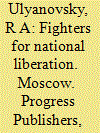

|
|
|
|
|
| Publication |
Moscow, Progress Publishers, 1984.
|
| Description |
175p.Pbk
|
|
|
|
|
|
|
|
|
|
|
|
Copies: C:1/I:0,R:0,Q:0
Circulation
| Accession# | Call# | Current Location | Status | Policy | Location |
| 025961 | 923.2/ULY 025961 | Main | On Shelf | General | |
|
|
|
|
| 6 |
ID:
154054


|
|
|
|
|
| Summary/Abstract |
In the summer of 1958, the Middle East was engulfed in crisis, and the Eisenhower administration was rethinking its regional policy. Israel saw a chance to demonstrate its value as a reliable strategic partner by supporting the Western military operation to secure Jordan. Prime Minister Ben-Gurion authorized overflights and tabled proposals for a strategic partnership. Though Washington proved responsive, Ben-Gurion abruptly terminated the overflights, and a severe diplomatic crisis ensued. It was neither sought nor welcomed by the parties, and left all baffled and dismayed. Ben-Gurion’s behaviour confounded contemporaries and historians: was he intimidated by Soviet threats? Did he yield to coalition pressures? Was he engaging in brinkmanship? New evidence shows that the root cause of the crisis was accidental, and ultimately it served only to cast doubt over Israel’s fortitude.
|
|
|
|
|
|
|
|
|
|
|
|
|
|
|
|
| 7 |
ID:
140273


|
|
|
|
|
| Summary/Abstract |
This article marks the fiftieth anniversary of the establishment of diplomatic relations between the Federal Republic of Germany and Israel. It is divided into two parts, assessing the status of this unique relationship in 2015 and in 1965, respectively. Angela Merkel's recent criticism of Benjamin Netanyahu's stance on the peace process with the Palestinians and the heavy protests that took place in Germany in the wake of Operation Protective Edge in Gaza in summer 2014 have cast doubt on the strength of the bilateral partnership fifty years after the first exchange of ambassadors between the two countries. However, by examining the state of German–Israeli cooperation in a number of areas (security, commerce and knowledge exchange, among others), the first part of the article challenges popular interpretations of contemporary German–Israeli relations as being ‘at a nadir’. Fifty years ago, Chancellor Ludwig Erhard proposed to his Israeli counterpart Levi Eshkol the establishment of diplomatic relations between the two countries amid a severe political crisis in Bonn, following a visit of the East German leader Walter Ulbricht to Gamal Abdel Nasser. While much has changed since then, the second part of the article argues that looking at the momentous events of 1965 can provide useful reference points for understanding the current state of relations between Germany and Israel.
|
|
|
|
|
|
|
|
|
|
|
|
|
|
|
|
| 8 |
ID:
093933


|
|
|
| 9 |
ID:
161383
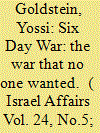

|
|
|
|
|
| Summary/Abstract |
As a military clash that it is still unclear if anyone truly wanted, the June 1967 Six Day War remains one of the most curious military conflicts in modern history. Israel certainly did not prefer the military route, and neither did Egypt, Syria, or the Soviet Union. Yet while it was clear to these parties from the outset that nothing good could come from such a clash, they backed Israel into a corner from which it was unable to extricate itself without going to war. This article explores the factors that caused the war at the time and in the manner it did.
|
|
|
|
|
|
|
|
|
|
|
|
|
|
|
|
| 10 |
ID:
111896


|
|
|
|
|
| Publication |
2012.
|
| Summary/Abstract |
This article examines the episode of an almost-forgotten war in the history of the Middle East conflict - the War of Attrition. While everyone agrees that the War of Attrition ended on August 7, 1970, there is controversy over when the war broke out. Some consider it to have begun in the summer of 1968 and others believe that it began with the bloody events that occurred immediately after the Six Day War. The IDF considers March 8, 1969 to be the day the war broke out because from that day on there was continuous fighting with the Egyptian side of the Suez Canal.
To show the American and Israeli failure, in the first four months of hostilities along the Suez Canal, to understand that the area was facing renewed conflict and another round of war. A direct consequence of that failure was the inability of both sides to adopt a suitable policy towards the emerging crisis. The article examines the beginning of the War of Attrition in the diplomatic arena, the Egyptian aims and objectives, and the American reaction. Other than presenting the facts, this article examines what the United States thought of the Egyptian moves, if and how much the United States was influenced by those moves, and Egyptian President Gamal Abdel Nasser's reaction to the steps taken by the Americans. Since the main focus is on the American foreign policy, most of the sources used for this article are American. In order to complete the picture, it is also important to examine the Israeli point of view and the last part will focus on that.
|
|
|
|
|
|
|
|
|
|
|
|
|
|
|
|
| 11 |
ID:
047125
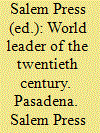

|
|
|
|
|
| Publication |
Pasadena, Salem Press INC, 2000.
|
| Description |
2v. (xx, 419-838p.)Hbk
|
| Series |
Magill's Choice
|
| Contents |
Vol. II.: William Lyon Mackenzie King-Boris Yeltsin
|
| Standard Number |
0893563374
|
|
|
|
|
|
|
|
|
|
|
|
Copies: C:1/I:0,R:0,Q:0
Circulation
| Accession# | Call# | Current Location | Status | Policy | Location |
| 044333 | 920/SAL 044333 | Main | On Shelf | General | |
|
|
|
|
|
|
|
|
|